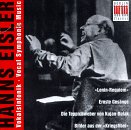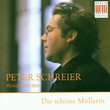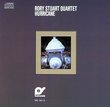| All Artists: Gunther Beyer, Gunther Leib, Hermann Hahnel, Hanns Eisler, Adolf Fritz Gruhl, Adolf Fritz Guhl, Dietrich Knothe, Gunther Herbig, Berlin Radio Symphony Orchestra, Berlin Sinfonie-Orchester Members, Berlin Symphony Orchestra, Leipzig Radio Symphony Orchestra, Sinfonie Orchester Berlin, Sinfonie-Orchester Berlin, Carola Nossek, Elisabeth Breul, Roswitha Trexler, Joachim Vogt, Annelies Burmeister Title: Hanns Eisler: Vocal Symphonic Music Members Wishing: 0 Total Copies: 0 Label: Berlin Classics Release Date: 2/18/1997 Genres: Special Interest, Pop, Classical Styles: Vocal Pop, Opera & Classical Vocal, Historical Periods, Early Music, Modern, 20th, & 21st Century Number of Discs: 1 SwapaCD Credits: 1 UPC: 782124923426 |
Search - Gunther Beyer, Gunther Leib, Hermann Hahnel :: Hanns Eisler: Vocal Symphonic Music
 | Gunther Beyer, Gunther Leib, Hermann Hahnel Hanns Eisler: Vocal Symphonic Music Genres: Special Interest, Pop, Classical
|
Larger Image |
CD DetailsSimilar CDs
|
CD ReviewsA Requiem that may never be performed in the U.S. Andrew G. Lang | Cleveland, OH USA | 05/03/2000 (5 out of 5 stars) "Hanns Eisler's "Lenin Requiem" has never been performed in the United States--and may never be. Eisler was nothing if not a contextual composer, and here the context is Eisler's identification with Lenin and the Russian Revolution. But this is no example of quasi-religious bombast in the style of "socialist realism"--Eisler uses advanced compositional techniques, including atonality, and for this reason the Lenin Requiem was never performed in the Soviet Union! It did reach the concert stage in the German Democratic Republic (East Germany), where Eisler settled after his deportation from the United States as a suspected Communist subversive in the Hollywood film industry. This is one of the rare performances--a collector's item of enduring musical worth.The Lenin Requiem is perhaps one of Eisler's most satisfying works: both the music and the text by Bertolt Brecht are free of hero worship (another reason the work was disliked by the Soviet cultural apparatus), but nevertheless communicate a sense of concentrated emotive power. It is also one of Eisler's more engaging attempts to write compositions that used the most progessive techniques of his day--including the 12-tone method of his teacher Arnold Schoenberg--but in a particularly simplified form so that the untrained ear would still hear the music as music.Also on the album is one of Eisler's least successful works--the "Party Cantata" written for the Fifth Congress of the ruling Communist Party of East Germany. Eisler's fans have described this as his "Wellington"--a reference to Beethoven's forgettable tribute to the British general. Even the Communist minister of culture, Johannes Becher, was embarrassed. Still, the cantata has the gusto of a lively collegiate fight song.Fortunately, Eisler was not really the favored court composer for the Communist regime his critics have made him out to be; not long after the Fifth Party Congress, he was exiled from East Germany because his musical theories did not fit in with the ruling doctrine of socialist realism in music, literature and art. He returned when Stalin's death signalled a cultural thaw throughout the Soviet empire. Shortly before his death, he wrote the "Ernste Gesaenge" ("Serious Songs"), also which are striking for their tenderness and emotional complexity, and buttress the argument that Eisler was perhaps one of the greatest composers of German lieder in the 20th century. They are presented here, along with the extraordinary miniatures Eisler wrote to Brecht's captions for a picture book describing war."
|

 Track Listings (48) - Disc #1
Track Listings (48) - Disc #1


